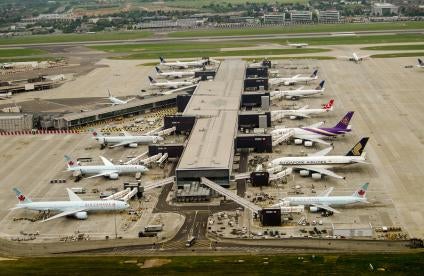Aviation Regulatory and Policy
Aviation Safety: European Commission updates the EU Air Safety List
On 2 June 2020, the European Commission updated the EU Air Safety List, which identifies the airlines subject to an operating ban or operational restrictions within the EU as they do not meet international safety standards. This update is based on the unanimous opinion of the aviation safety experts from the Member States who met from 12 to 14 May 2020 as part of the EU Air Safety Committee (ASC). Following this update, a total of 96 airlines are banned from EU skies. An additional 3 airlines are subject to operational restrictions and can only fly to the EU with specific aircraft types. All airlines certified in Armenia have been added to the list, following further assessment of the country's safety oversight capabilities, whereas the list of air carriers certified in Congo (Brazzaville), Democratic Republic of Congo, Kyrgyzstan, Libya, Nepal, and Sierra Leone has been reviewed and amended with the addition of new carriers and the removal of those which no longer exist.
Aviation Safety: Application of requirements from Commission Regulation (EU) 2018/1042 deferred to 14 February 2021
On 4 June 2020, the European Commission adopted Commission Implementing Regulation (EU) 2020/745 amending Regulation (EU) 2018/1042 as regards postponing dates of application of certain measures in the context of the COVID-19 pandemic. In particular, confinement and changes in the working conditions and availability of employees, combined with the additional workload required to manage the significant negative consequences of the COVID-19 pandemic on all stakeholders, have severely limited the ability of Member States and the aviation industry to prepare for the application of a number of recently adopted Implementing Regulations in the field of aviation safety. In light of this situation, Member States will not be able to apply the new requirements for alcohol testing, peer support programmes, and psychological assessments of pilots within the timeframe laid down in Commission Regulation (EU) 2018/1042 by the set deadline of 14 August 2020, as that could hinder the availability of crews at the resumption of flights in the context of the recovery from the COVID-19 pandemic. In response to this situation, Commission Regulation 2020/745 defers the date of application of these requirements by six months, to 14 February 2021. This deferral is judged to have no detrimental effect on aviation safety.
Aviation emissions: European Union adopts its position on adjusted CORSIA baseline to take into account the consequences of COVID-19 pandemic
On 9 June 2020, the Council of the EU adopted a decision adapting the EU position on the reference period to be used for measuring the growth of CO2 emissions in international aviation in order to take account of the unprecedented drop in air traffic due to the COVID-19 pandemic. The reference period determines the objective for the stabilisation of emissions to be achieved by international aviation under the Carbon Offsetting and Reduction Scheme for International Aviation (CORSIA) and the amount of offsets to be purchased by the airlines in order to meet that objective. The goal of CORSIA is to contribute to the objectives of the Paris Agreement to address climate change in the context of international aviation. It complements a broader set of measures, including aircraft technology improvements, operational improvements and sustainable aviation fuels, to achieve carbon-neutral growth from 2020 onwards, to be reviewed every three years. The first review is scheduled for 2022, whereas its pilot phase is due to start in 2021. According to the EU position as set out by the decision, the amended baseline period for the emission values used to calculate growth factors should refer to 2019 emission levels. This decision amends the corresponding Council decision from 2016 and was adopted by written procedure.
IATA Reports: Air Cargo and Passenger Demand for April 2020
On 1 June 2020, the International Air Transport Association (IATA) released data for global air freight markets for April 2020, showing that global demand, measured in cargo tonne kilometers (CTKs), decreased by 27.7% in April 2020, which marks the sharpest fall ever recorded. The report also demonstrates a severe capacity shortfall as global capacity, measured in available cargo tonne kilometers (ACTKs), plummeted by 42% in April 2020 compared to the previous year. IATA’s report stresses that the result is damaging global supply chains with longer shipping times and higher cost given that airlines are deploying as much capacity as possible, including special charter operations and the temporary use of passenger cabins for cargo. In this context, IATA’s report urges governments to take some necessary steps in order for vital supply lines to remain open and efficient, including: (i) accelerate approvals for cargo operations; (ii) expedite customs clearance for urgently needed medical supplies; and (iii) ensure there is adequate staff on the ground and land-based infrastructure to move cargo efficiently. On 3 June 2020, IATA released the global passenger traffic data for April 2020, showing that demand, measured in revenue passenger kilometers or RPKs, plunged 94.3% compared to April 2019, as the COVID-19-related travel restrictions virtually shut down domestic and international air travel. However, Alexandre de Juniac, IATA’s Director General and CEO mentioned that there are some positive signs as countries are beginning to lift mobility restrictions and business confidence is showing improvement in key markets, such as China, Germany, and the US.
IATA Reports: IATA releases its financial outlook for the global air transport industry in 2020
On 9 June 2020, IATA released its financial outlook for the global air transport industry in 2020, showing that airlines are expected to lose $84.3 billion for a net profit margin of -20.1%. Revenues will fall by 50% to $419 billion compared to $838 billion in 2019. In 2021, losses are expected to be cut to $15.8 billion as revenues rise to $598 billion. With respect to passenger demand, traffic levels, measured in revenue passenger kilometer, are expected to fall by 54.7% in 2020 as opposed to 2019. As regards passenger revenues, these are expected to fall to $241 billion in 2020, which is down from $612 billion in 2019. However, according to the report, cargo seems to be the one bright spot, as cargo revenues are expected to reach a near-record of $110.8 billion in 2020, which is up from $102.4 billion in 2019 and, as a portion of industry revenues, cargo will contribute approximately 26%, which is up from 12% in 2019. Nevertheless, a severe shortage in cargo capacity due to the unavailability of belly cargo on (grounded) passenger aircraft is expected to push rates up by some 30% for the year. Although losses will be significantly reduced in 2021 from 2020 levels, the report stresses that the aviation industry’s recovery is expected to be long and challenging. Alexandre de Juniac, IATA’s Director General and CEO mentioned that a key to the recovery is the universal implementation of the re-start measures agreed through the International Civil Aviation Organization (ICAO) to keep passengers and crew safe.
Antitrust and Competition
State Aid: European Commission approves €6 billion German measure to recapitalise Lufthansa
On 25 June 2020, the European Commission approved German plans to contribute €6 billion to the recapitalisation of Deutsche Lufthansa AG (DLH), the parent company of Lufthansa Group. The recapitalisation measure is part of a larger support package that also includes a state guarantee on a €3 billion loan that Germany plans to grant to DLH as individual aid under the German scheme approved by Commission decision of 22 March 2020. The Commission found that the German measure is in line with Article 107(3)(b) TFEU and the conditions set out in the the State aid Temporary Framework. In particular, the Commission assessed: (i) the necessity, appropriateness and size of intervention; (ii) the conditions on the German State’s entry in the capital of companies and remuneration; (iii) the conditions regarding the exit of the German State from the capital of the companies concerned; and (iv) governance conditions. Taking into consideration DLH’s significant market power on the relevant market on which it operates, further commitments to preserve effective and fair competition (including an acquisition ban and transparency measures) will be implemented to ensure that DLH does not unduly benefit from the recapitalisation aid by the German State. The Commission found that the recapitalisation measure will contribute to manage the economic impact of the COVID-19 outbreak in Germany while maintaining the necessary safeguards to limit competition distortions. On this basis, the Commission approved the measure under EU State aid rules. Competiting airlines have critised the aid to DLH that was considered out of proportion and distorting competition, and some of these airlines are considering challenging the Commission’s clearance decision.
State Aid: European Commission approves €1.2 billion Portuguese urgent liquidity support to TAP
On 10 June 2020, the European Commission approved Portugal's plans to grant a €1.2 billion rescue loan in favour of Transportes Aéreos Portugueses SGPS S.A. (TAP). Portugal notified the Commission of its intention to grant a €1.2 billion rescue loan to TAP, aiming at providing TAP with sufficient resources to address its immediate liquidity needs, with a view of preparing a plan for the long-term viability of the company. TAP was not eligible to receive support under the Commission's State aid Temporary Framework, aimed at supporting otherwise viable companies, as it has been facing financial difficulties already before the COVID-19 outbreak. The Commission therefore assessed the measure under its Guidelines on rescue and restructuring, which enable Member States to support companies in difficulty. The Commission found that the measure will help avoiding disruptions for passengers, in particular in view of the easing of travel restrictions and the upcoming touristic season. It will thus indirectly support the Portuguese tourism sector, which has been hit hard by the COVID-19 outbreak. At the same time, the Commission found that the Portuguese authorities’ commitment that TAP will reimburse the loan or submit a restructuring plan within six months, as well as the strict conditions attached to the loan in terms of remuneration, will reduce to a minimum the distortion of competition potentially triggered by the State support. On this basis, the Commission concluded that the measure is in line with EU State aid rules.
State Aid: The Dutch Government offers financial support to KLM as a result of the COVID-19 crisis
On 26 June 2020, the Dutch government announced its plan to support KLM for an amount of €3.4 billion. The support consists of: (i) a guarantee for bank loans of up to €2.4 billion; and (ii) a direct loan from the Dutch state of up to €1 billion. The government has set conditions for the financial support, such as a cost reduction by KLM of 15%, a reduction in the number of night flights and an active contribution to sustainability. The government has also appointed a so-called state agent to supervise the use of the funds received to ensure that the implementation of the agreements made is duly monitored. The support package for KLM has been formally submitted to the European Commission for approval.
Air Travel - Passengers' Rights
Air Travel: ICAO publishes global guidelines for restoring air connectivity
On 1 June 2020, the International Civil Aviation Organization’s (ICAO) Council adopted a new report and recommendations aiming at restarting the international air transport system and aligning its global recovery. This report called "Takeoff: Guidance for Air Travel through the COVID-19 Public Health Crisis” contains a detailed analysis and key principles supported by a series of recommendations focused around the objectives for public health, aviation safety and security, as well as aviation economic recovery, including: (i) physical distancing to the extent feasible and implementation of adequate risk-based measures where distancing is not feasible; (ii) wearing of face coverings and masks by passengers and aviation workers; (iii) routine sanitation and disinfection of all areas with potential for human contact and transmission; (iv) health screening, which could include pre- and post-flight self-declarations, as well as temperature screening and visual observation; (v) contact tracing for passengers and aviation employees; (vi) passenger health declaration forms, including self-declarations in line with the recommendations of relevant health authorities; and (vii) testing.
Passengers’ Rights: CJEU rules that the unruly behaviour of an air passenger may exempt the carrier from its obligation to pay compensation for the cancellation or long delay of the flight concerned or of a subsequent flight operated by that carrier using the same aircraft
On 11 June 2020, the Court of Justice of the European Union (CJEU) issued its judgement in the Case C-74/19. This case originates from a dispute between a passenger and the air carrier, Transportes Aéreos Portugueses (TAP), regarding a refusal by the latter to compensate that passenger whose connecting flight was subject to a long delay in arrival at its final destination. The air carrier had refused to accept the claim for compensation on the grounds that the flight delay resulted from the unruly behaviour of a passenger on a previous flight operated using the same aircraft, which led to the re-routing of the aircraft, and that this circumstance had to be classified as ‘extraordinary’ within the meaning of Regulation No 261/2004 on the rights of air passengers. The CJEU held that the unruly behaviour of a passenger, which has justified the pilot in command of the aircraft in diverting the flight concerned to an airport other than the airport of arrival, in order to disembark that passenger and his baggage, falls within the concept of ‘extraordinary circumstances’ within the meaning of the Regulation No 261/2004. Such ‘extraordinary circumstances’ are met unless the operating air carrier contributed to the occurrence of the passenger’s behaviour, or failed to take appropriate measures in view of the warning signs of such behaviour, which is for the national court to verify. In addition, the CJEU stated that in the event of the occurrence of an ‘extraordinary circumstance’, the air carrier, which seeks to be exempted from its obligation to compensate passengers, must deploy all the resources at its disposal to ensure reasonable, satisfactory and timely re-routing. This also includes seeking for an alternative direct or indirect flights, which may be operated by other air carriers, whether or not belonging to the same airline alliance, and arriving at a scheduled time before the next available flight of the air carrier concerned.
International Trade - Brexit
International Trade: European Union signs aviation agreement with the Republic of Korea
On 25 June 2020, the European Union and the Republic of Korea signed an Horizontal Aviation Agreement, allowing any EU airline to fly to the Republic of Korea from each EU Member State, which has a bilateral air services agreement with the Republic of Korea. Traditionally, in a bilateral air services agreement, only airlines owned and controlled by a given Member State or its nationals may fly between that Member State and a third country. The conclusion of this horizontal agreement marks a key deliverable under the Commission's Aviation Strategy for Europe and offers important opportunities to all EU airlines. On 30 June 2020, the leaders of the EU and the Republic of Korea welcomed the signing of the agreement and reiterated their joint commitment to working towards establishing a High-Level Transport Dialogue across all modes of transport. At this stage, both the EU and the Republic of Korea will proceed with their respective internal procedures to put the conclusion of the agreement in place.
International Trade: European Commission signs aviation agreement with Japan
On 22 June 2020, the European Commission and Japan signed a bilateral agreement on civil aviation safety (BASA), one year and a half after the conclusion of the EU and Japan's Economic Partnership Agreement and the implementation of the Strategic Partnership Agreement between the EU and Japan. This BASA is expected to support EU manufacturers of aeronautical products to increase their trade and market share in the Japanese market and plays an important role in the recovery of the sector from the current COVID-19 crisis. In particular, the main objectives of the BASA include, among others, to: (i) ease trade in aircraft and related products; (ii) remove unnecessary duplications of evaluation and testing activities for aeronautical products; (iii) decrease costs for authorities and the aviation industry; (iv) reduce the time required for manufacturers of aeronautical products to achieve the approvals for exports to Japan; and (v) provide a stronger level of legal certainty, including on intellectual property rights (IPR). At this stage, both the EU and Japan will move forward with their respective internal procedures to put the conclusion of the agreement in place. Pending its entry into force, the agreement will be provisionally applied from signature.
Public Consultations and Events
Public Consultation: European Commission consults stakeholders on the Market Definition Notice
On 26 June 2020, the European Commission published a public consultation on the Market Definition Notice used in EU competition law, which will feed into the Commission's evaluation to assess whether it requires updating. As the current Market Definition Notice dates from 1997 and may therefore not address all pertinent questions arising today when defining the relevant product and geographic market, the Commission is seeking stakeholders' feedback in addition to its research into best practices in market definition. This includes an exchange of views with national competition authorities within and outside the EU, and takes into consideration EU courts’ additional guidance. Stakeholders can submit their views and respond to the open public consultation until 9 October 2020 in any official EU language.The Commission aims at publishing the results of the evaluation in 2021.






 i
i

